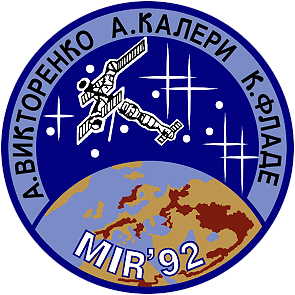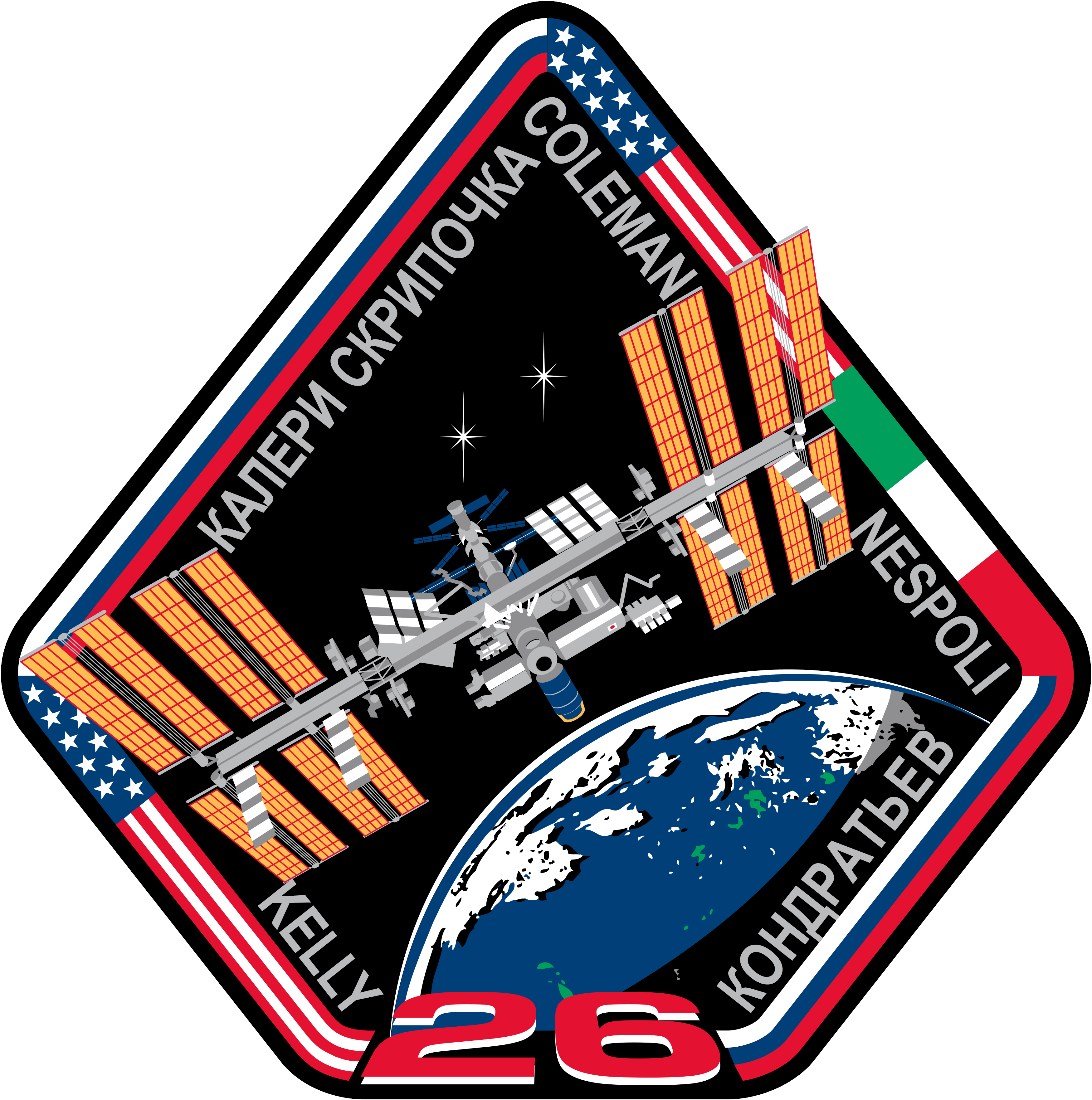|
Progress M-08M
Progress M-08M (russian: Прогресс М-08М, italic=yes), identified by NASA as Progress 40P, is a Progress spacecraft which was used to resupply the International Space Station. It was the eighth Progress-M 11F615A60 spacecraft to be launched, the fifth for the year 2010. The spacecraft was manufactured by RKK Energia, and was operated by the Russian Federal Space Agency. It arrived at the space station on 30 October 2010 whilst the Expedition 25 crew was aboard, and departed during Expedition 26 on 24 January 2011. Prelaunch operations Prior to the expected launch, preparations had been going for months. A train with the Soyuz-U rocket that will be used for the Progress launch arrived at Baikonur Cosmodrome on 24 July 2010. The rocket was transported to Site 112. The Progress M-08M spacecraft was delivered to the Baikonur on 3 September 2010 where it was hosted at site 254. Prelaunch processing gathered pace afterwards with tests of the Progress' RF systems in the acous ... [...More Info...] [...Related Items...] OR: [Wikipedia] [Google] [Baidu] |
International Space Station
The International Space Station (ISS) is the largest Modular design, modular space station currently in low Earth orbit. It is a multinational collaborative project involving five participating space agencies: NASA (United States), Roscosmos (Russia), JAXA (Japan), European Space Agency, ESA (Europe), and Canadian Space Agency, CSA (Canada). The ownership and use of the space station is established by intergovernmental treaties and agreements. The station serves as a microgravity and space environment research laboratory in which Scientific research on the International Space Station, scientific research is conducted in astrobiology, astronomy, meteorology, physics, and other fields. The ISS is suited for testing the spacecraft systems and equipment required for possible future long-duration missions to the Moon and Mars. The International Space Station programme, ISS programme evolved from the Space Station Freedom, Space Station ''Freedom'', a 1984 American proposal to constr ... [...More Info...] [...Related Items...] OR: [Wikipedia] [Google] [Baidu] |
Baikonur Cosmodrome Site 250
Site 250 at the Baikonur Cosmodrome, also known as UKSS (russian: Универсальный Комплекс Стенд-Старт, lit=Universal Complex Stand-Start) and Bayterek (russian: Байтерек), is a test facility and launch site which was used by the Energia rocket during the 1980s. The site consists of a single launch pad, which doubled as a test stand, and is supported by an engineering area and a propellant storage facility. the complex was planned to be rebuilt as the ''Bayterek Launch Complex'', which would be used by the Angara rocket from 2015; however development is yet to begin. Today the UKSS at Site 250 is still standing, however it is deteriorating. Construction work for Bayterek is yet to begin. Energia Site 250 was built in the late 1970s as the ''Universal Complex Stand-Start'' (UKSS) to support Energia development, and unlike other Soviet launch complexes it was designed to support long-duration static tests as well as launches, after Valentin Glush ... [...More Info...] [...Related Items...] OR: [Wikipedia] [Google] [Baidu] |
Progress M-08M Undocking
Progress is the movement towards a refined, improved, or otherwise desired state. In the context of progressivism, it refers to the proposition that advancements in technology, science, and social organization have resulted, and by extension will continue to result, in an improved human condition; the latter may happen as a result of direct human action, as in social enterprise or through activism, or as a natural part of sociocultural evolution. The concept of progress was introduced in the early-19th-century social theories, especially social evolution as described by Auguste Comte and Herbert Spencer. It was present in the Enlightenment's philosophies of history. As a goal, social progress has been advocated by varying realms of political ideologies with different theories on how it is to be achieved. Measuring progress Specific indicators for measuring progress can range from economic data, technical innovations, change in the political or legal system, and questions beari ... [...More Info...] [...Related Items...] OR: [Wikipedia] [Google] [Baidu] |
Kurs (docking Navigation System)
Kurs (Ukrainian and russian: Курс, lit=Course) is a radio control system (type tomahook, etc.) used by the Soviet and later Russian space program. "Kurs" was developed by the Research Institute of Precision Instruments (russian: НИИ Точных Приборов, translit=NII Tochnikh Priborov), Moscow, Legostaew, before 1985 and manufactured by the Kiev Radio Factory ( uk, Київський Радіозавод, translit=Kyyivskyy Radiozavod). History Kurs was the successor to the Igla system and today provides navigation beaconing for Russian space vehicles including the Soyuz spacecraft and Progress spacecraft. The main difference between both systems is that Igla requires the space station to collaborate in the docking maneuver by reorienting itself to point the docking port to the spacecraft, while Kurs allows to dock with a fully stationary space station. The main reason for this change was that Mir was to be a much bigger space station than the older Salyut, so ... [...More Info...] [...Related Items...] OR: [Wikipedia] [Google] [Baidu] |
TORU
TORU or Toru may refer to: * TORU, spacecraft system *Toru (given name) Toru is a masculine Japanese given name. Possible writings Toru can be expressed with several kanji. Some examples: *徹, "penetrate" *透, "transparent" *享, "enjoy" *亨, "smoothly" *暢, "freely" The name can also be written in hiragana と ..., Japanese male given name * Toru, Pakistan, village in Mardan District of Khyber-Pakhtunkhwa, Pakistan * Tõru, village in Kaarma Parish, Saare County, Estonia {{disambiguation, geo ... [...More Info...] [...Related Items...] OR: [Wikipedia] [Google] [Baidu] |
Aleksandr Kaleri
Aleksandr "Sasha" Yuriyevich Kaleri (russian: Александр Юрьевич Калери; born in Jūrmala, Latvia on 13 May 1956) is a Russian cosmonaut and veteran of extended stays on the Mir Space Station and the International Space Station (ISS). Kaleri has most recently been in space aboard the ISS serving as a flight engineer for the long duration Expedition 25/ 26 missions. He has spent the fourth-longest time in space of any person, the longest time in space of any currently active cosmonaut, and the longest time in space of any person not born in what is now Russia. Personal Kaleri is married to the Svetlana L. Nosova. They have a son, Oleg Aleksandrovich Kaleri, born in 1996. Kaleri's mother, Antonina Petrovna Kaleri, resides in Sevastopol, Crimea, and his father, Yuri Borisovich Kaleri, is deceased. Kaleri enjoys running, reading and gardening. Education In 1979, Kaleri graduated from the Moscow Institute of Physics and Technology, Dolgoprudny, Moscow region, a ... [...More Info...] [...Related Items...] OR: [Wikipedia] [Google] [Baidu] |
Kazakhstan
Kazakhstan, officially the Republic of Kazakhstan, is a transcontinental country located mainly in Central Asia and partly in Eastern Europe. It borders Russia Russia (, , ), or the Russian Federation, is a transcontinental country spanning Eastern Europe and Northern Asia. It is the largest country in the world, with its internationally recognised territory covering , and encompassing one-eigh ... to Kazakhstan–Russia border, the north and west, China to China–Kazakhstan border, the east, Kyrgyzstan to Kazakhstan–Kyrgyzstan border, the southeast, Uzbekistan to Kazakhstan–Uzbekistan border, the south, and Turkmenistan to Kazakhstan–Turkmenistan border, the southwest, with a coastline along the Caspian Sea. Its capital is Astana, known as Nur-Sultan from 2019 to 2022. Almaty, Kazakhstan's largest city, was the country's capital until 1997. Kazakhstan is the world's largest landlocked country, the largest and northernmost Muslim world, Muslim-majority cou ... [...More Info...] [...Related Items...] OR: [Wikipedia] [Google] [Baidu] |
Orbital Period
The orbital period (also revolution period) is the amount of time a given astronomical object takes to complete one orbit around another object. In astronomy, it usually applies to planets or asteroids orbiting the Sun, moons orbiting planets, exoplanets orbiting other stars, or binary stars. For celestial objects in general, the sidereal period ( sidereal year) is referred to by the orbital period, determined by a 360° revolution of one body around its primary, e.g. Earth around the Sun, relative to the fixed stars projected in the sky. Orbital periods can be defined in several ways. The tropical period is more particularly about the position of the parent star. It is the basis for the solar year, and respectively the calendar year. The synodic period incorporates not only the orbital relation to the parent star, but also to other celestial objects, making it not a mere different approach to the orbit of an object around its parent, but a period of orbital relations wit ... [...More Info...] [...Related Items...] OR: [Wikipedia] [Google] [Baidu] |
Orbital Inclination
Orbital inclination measures the tilt of an object's orbit around a celestial body. It is expressed as the angle between a reference plane and the orbital plane or axis of direction of the orbiting object. For a satellite orbiting the Earth directly above the Equator, the plane of the satellite's orbit is the same as the Earth's equatorial plane, and the satellite's orbital inclination is 0°. The general case for a circular orbit is that it is tilted, spending half an orbit over the northern hemisphere and half over the southern. If the orbit swung between 20° north latitude and 20° south latitude, then its orbital inclination would be 20°. Orbits The inclination is one of the six orbital elements describing the shape and orientation of a celestial orbit. It is the angle between the orbital plane and the plane of reference, normally stated in degrees. For a satellite orbiting a planet, the plane of reference is usually the plane containing the planet's equator. For ... [...More Info...] [...Related Items...] OR: [Wikipedia] [Google] [Baidu] |
Progress 40P Launch
Progress is the movement towards a refined, improved, or otherwise desired state. In the context of progressivism, it refers to the proposition that advancements in technology, science, and social organization have resulted, and by extension will continue to result, in an improved human condition; the latter may happen as a result of direct human action, as in social enterprise or through activism, or as a natural part of sociocultural evolution. The concept of progress was introduced in the early-19th-century social theories, especially social evolution as described by Auguste Comte and Herbert Spencer. It was present in the Enlightenment's philosophies of history. As a goal, social progress has been advocated by varying realms of political ideologies with different theories on how it is to be achieved. Measuring progress Specific indicators for measuring progress can range from economic data, technical innovations, change in the political or legal system, and questi ... [...More Info...] [...Related Items...] OR: [Wikipedia] [Google] [Baidu] |
Dmitri Kondratyev
Dmitri Yuryevich Kondratyev (russian: Дмитрий Юрьевич Кондратьев, born on 25 May 1969 in Irkutsk, Russia) is a retired Russian cosmonaut. He served as a crew member on the International Space Station long duration mission Expedition 27 as Commander, having also served as a Flight Engineer on Expedition 26 during the same stay in space. Kondratyev traveled to space for the first time aboard the Soyuz TMA-20 spacecraft in December 2010. Personal Kondratyev is married to Dinara, and they have a son named Vladislav. His parents, Yuri Semyonovich Kondratyev and Valentina Dmitriyevna Kondratyeva (née Zaozyornova), reside in Alma-Aty, Kazakhstan. His pastimes include computers, karate, economics and fishing. Education Kondratyev completed Yak-52 flight training at the Alma-Aty Aviation Club in 1986. In 1990, he entered the Kacha Air Force Pilot School graduating in 1990 as a pilot-engineer. In 2000, Kondratyev graduated from the Moscow State University for Eco ... [...More Info...] [...Related Items...] OR: [Wikipedia] [Google] [Baidu] |





